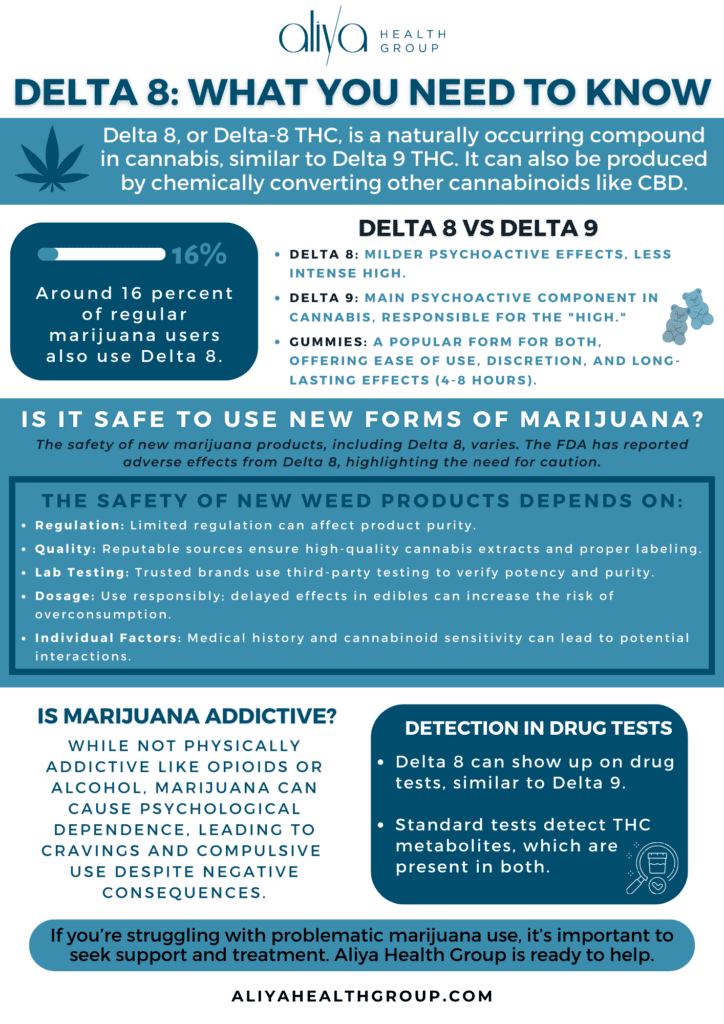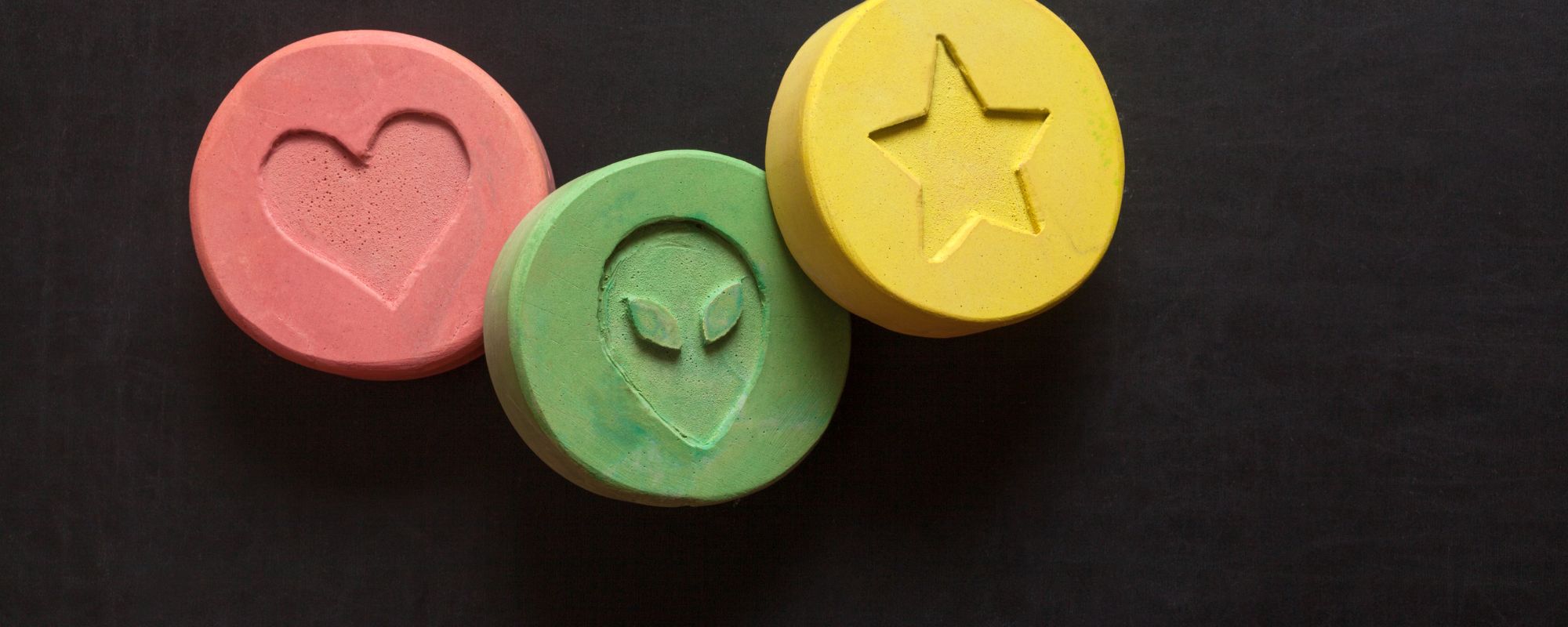You may have seen headlines about a drug called Delta 8 in recent years. Some people say it’s the next big thing in cannabis, offering a milder high than regular marijuana. So, what exactly is Delta 8? Is it legal, and will it show up on drug tests?
What Is Delta 8?
Delta 8, or Delta-8 THC, is a naturally occurring compound found in the cannabis plant. Alongside its more well-known counterpart Delta 9, Delta 8 is one of the main ingredients in marijuana. Delta 8 THC can also be produced through chemical conversion of other cannabinoids, such as CBD (cannabidiol), using various methods.
In 2012, Colorado, and Washington paved the way for the legal sale and consumption of recreational marijuana. Many states have followed suit, and to date, the following states have fully legalized marijuana:
Alaska, Arizona, California, Colorado, Connecticut, Delaware, Illinois, Maine, Maryland, Massachusetts, Michigan, Minnesota, Missouri, Montana, Nevada, New Jersey, New Mexico, New York, Ohio, Oregon, Rhode Island, Vermont, Virginia, Washington, and the District of Columbia.
The remaining states have various legal stipulations regarding medical marijuana and CBD oil. However, there are still four states (Idaho, Kansas, South Carolina, and Wyoming) where marijuana remains fully illegal in all forms.
With the legalization of marijuana, a variety of products Delta 8 products have hit the market. According to one recent study, 16 percent of regular marijuana users also use Delta 8. Delta 8 products come in many forms, such as edibles, vape cartridges, and tinctures. Because of the relaxing effects, many people rely on Delta 8 gummies for sleep. Many others combine Delta 8 with other prescription drugs like Xanax to intensify the sense of calmness.
Delta 8 vs Delta 9: What’s the Difference?
Despite their similar names and shared origins in the cannabis plant, Delta 8 and Delta 9 differ in their chemical structures and effects on the body.
Delta 9 THC is the main psychoactive ingredient in cannabis. It’s responsible for inducing the euphoric “high” that comes with consuming it. Delta 8 is similar, but it delivers a milder psychoactive effect. This is because the two compounds have a subtle difference in chemical structure.
At a molecular level, Delta 8 and Delta 9 differ in the placement of a double bond within their chemical structures. Delta 9 has the bond on the ninth carbon chain, while Delta 8 THC has it on the eighth. This seemingly tiny difference affects the potency and psych activity between the two compounds.
Gummies are one of the most popular forms of consuming both Delta 8 and Delta 9. Their popularity stems from several factors:
- Ease of Use: Gummies are easy to consume and dose, making them convenient to enjoy without the need for special equipment or preparation.
- Discreetness: Gummies are discreet and can be consumed in public without drawing attention, unlike smoking or vaping.
- Variety: Gummies come in many flavors, strengths, and formulations to suit preferences and needs.
- Duration of Effects: Many people wonder, “How long do Delta 8 gummies last?” and “How long do Delta 9 gummies last?” Typically, the effects of both gummies can last anywhere from 4 to 8 hours, but this can vary from person to person. This is why many people use gummies for sleep.
- Precise Dosing: Gummies typically come in pre-dosed servings, making it easier for users to control their intake and avoid accidentally taking too much.
Get confidential help from our addiction and mental health treatment facilities located across the United States. Call to join one of our quality programs today!
Speak With Our Admissions Team
Drug Tests
In terms of drug testing methods, both Delta 8 and Delta 9 have the potential to trigger a positive result on a test. Detecting delta 8 in the body is the same process as detecting delta 9. Standard drug screenings typically detect the presence of THC metabolites in urine testing samples, regardless of whether they’re from Delta 8 or Delta 9. THC can also be detected via blood testing and hair testing, but these are less common. Therefore, you should exercise caution if you have a drug test coming up because marijuana of all kinds stays in your system for up to a month in some cases.
How to Get Delta-8 Out of Your System for a Drug Test
The fact is, clearing Delta 8 from your system isn’t easy and it will take at least a few days. While there are no evidence-based tactics, there are a few things that can help.
- Hydrate: Focus on drinking plenty of water. Since Delta 8 is excreted via the kidneys, this may help flush out any residue of Delta 8 from your system. Common beverages like green tea or jasmine tea can also make you urinate more often, which could play a role in getting rid of Delta 8.
- Exercise: The metabolites of THC tend to store up in your fat cells. Cardio-driven and weight-training exercises may help you boost your metabolism to burn more fat, reducing the amount of THC in your body.
- Avoid Alcohol: Alcohol can boost the storage of THC in your fat cells. Once THC is stored in your fat cells, removing it becomes challenging. Avoid alcohol if you have a drug test coming up.
Is It Safe to Use New Forms of Marijuana?
The safety of using new forms of marijuana, including products containing Delta 8, depends on various factors. About Delta 8 specifically, the FDA has stated it has received several reports of bad experiences, underscoring the need for caution when using products containing this ingredient.
The safety of new forms of weed depends on:
- Regulation and Legality: In areas with limited regulation, there may be concerns about the purity of the products.
- Quality and Source: Reputable manufacturers use high-quality cannabis extracts and adhere to strict manufacturing standards to ensure the quality of ingredients. Without proper labeling, you can’t be sure you’re getting a quality product.
- Lab Testing: Trusted manufacturers typically conduct third-party lab testing to verify the potency and purity of their products.
- Dosage and Consumption: As with any substance, including marijuana, it’s crucial to use new forms responsibly and in moderation. Edibles and other oral consumption methods have a delayed effect and last longer. That delay can increase the risk of overconsumption and negative effects.
- Individual Factors: Things like medical history and sensitivity to cannabinoids can cause potential interactions.
Is Marijuana Addictive?
The question of whether marijuana is addictive is a complex and often debated topic. While weed doesn’t produce physical dependence in the same way opioids or alcohol do, it can lead to psychological dependence or addiction in some individuals.
Unlike drugs such as heroin or cocaine, which can cause severe physical withdrawal symptoms when you stop using them, marijuana withdrawal tends to be milder. Symptoms can include:
- Irritability
- Mood swings
- Insomnia
- Decreased appetite
- Cravings for weed
It’s important to recognize that physical withdrawal symptoms aren’t the only sign of addiction. Some people experience psychological symptoms, where they rely on the drug to cope with stress, anxiety, depression, or other underlying issues.
People who use weed regularly, particularly in high doses or with other substances, may be at a higher risk of developing dependence or addiction. Several factors can influence the likelihood of developing marijuana addiction, including:
- Frequency and duration of use
- Potency of the drug
- Individual susceptibility
- Co-occurring mental health conditions
Treatment options for marijuana addiction typically involve behavioral therapies, counseling, and support groups. They each focus on underlying psychological factors and aim to help users quit. While there are currently no FDA-approved medications specifically for treating marijuana addiction, there are plenty available to manage co-occurring mental health conditions or withdrawal symptoms.
Looking for quality treatment for substance abuse and mental health that’s also affordable? Aliya Health Group's treatment facilities accept most major insurance providers. Get a free insurance benefits check now!
Check Your CoverageDrug Addiction Treatment at Aliya Health Group
Aliya Health Group’s drug treatment centers provide a loving, caring, health-centered environment for adults with addiction challenges and their families. We offer a variety of evidence-based and holistic approaches, so you can find the support you need on your recovery journey.
Our treatment team of highly credentialed behavioral health experts brings together unique specializations to provide the best care possible. We believe that anyone can obtain long-term recovery, and we’re committed to delivering exceptional treatment and essential support that will empower anyone to succeed.
For more information about our drug addiction treatment programs, contact us today at (888) 973-2078.

















